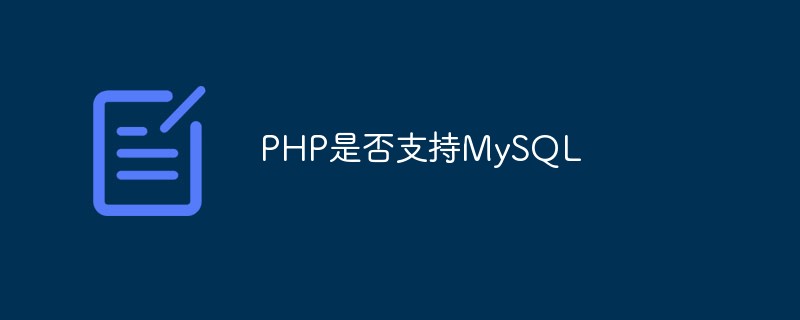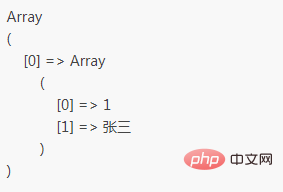Does PHP support MySQL?
PHP supports MySQL; MySQL is the database most commonly used with PHP, and they are often called the "golden combination". PHP provides complete functions for operating the MySQL database. These functions include everything from connecting to the database, executing SQL statements, processing data result sets, and closing the database. Through these functions, web development based on the MySQL database is made efficient and simple.

The operating environment of this tutorial: windows7 system, PHP8.1&&mysql8 version, Dell G3 computer.
The database can be said to be an indispensable part of a website. Nowadays, there are many kinds of databases in the database field. As a popular web page programming technology, the interaction between PHP and databases is inevitable.
PHP can operate a variety of databases, and MySQL is the most commonly used database with PHP. They are often called the "golden combination".
PHP provides complete functions for operating the MySQL database. These functions include everything from connecting to the database, executing SQL statements, processing data result sets to closing the database; through these functions, the Web based on the MySQL database Development is efficient and simple.
Usually the steps for PHP to access the MySQL database are as shown below:

Before this, we need to ensure that the mysqli extension in PHP is turned on. Taking the Windows system as an example, to enable the mysqli extension is to remove the comment extension=mysqli (php7) or extension=php_mysqli.dll (php5) in the php.ini configuration file. Can.
php connects to MySQL database
#When we successfully enable the mysqli extension in PHP, we can use the mysqli_connect() function in the extension. MySQL database connection, the function syntax format is as follows:
mysqli_connect(
[string $host = ini_get("mysqli.default_host")
[, string $username = ini_get("mysqli.default_user")
[, string $password = ini_get("mysqli.default_pw")
[, string $dbname = ""
[, int $port = ini_get("mysqli.default_port")
[, string $socket = ini_get("mysqli.default_socket")
]]]]]] )Parameter description is as follows:
$host: Optional parameter, the server to be connected. It can be a host name or an IP address;
$username: optional parameter, the MySQL user name used to log in;
$password : Optional parameter, the password used to log in;
$dbname: Optional parameter, the default database used when executing queries;
$ port: optional parameter, specifies the port number to connect to the MySQL server;
$socket: optional parameter, specifies the socket or named pipe to be used, this parameter is very important during development Use sparingly.
It should also be noted that the mysqli_connect() function is an alias of the mysqli::__construct() function, and all objects using mysqli() can also be used to connect to the database.
[Example] The following is a simple code to connect to the database.
1) Process-oriented writing method
<?php
$host = 'localhost';
$username = 'root';
$password = 'root';
$dbname = 'test';
$port = '3306';
$link = @mysqli_connect($host,$username,$password,$dbname,$port); // 连接到数据库
if($link){
mysqli_set_charset($link,'UTF-8'); // 设置数据库字符集
$sql = 'select * from user'; // SQL 语句
$result = mysqli_query($link, $sql); // 执行 SQL 语句,并返回结果
$data = mysqli_fetch_all($result); // 从结果集中获取所有数据
mysqli_close($link);
}else{
die('数据库连接失败!');
}
echo '<pre class="brush:php;toolbar:false">';
print_r($data);
?>2) Object-oriented writing method
<?php
$host = 'localhost';
$username = 'root';
$password = 'root';
$dbname = 'test';
$mysql = new Mysqli($host, $username, $password, $dbname);
if($mysql -> connect_errno){
die('数据库连接失败:'.$mysql->connect_errno);
}else{
$mysql -> set_charset('UTF-8'); // 设置数据库字符集
$sql = 'select * from user'; // SQL 语句
$result = $mysql -> query($sql);
$data = $result -> fetch_all();
$mysql -> close();
}
echo '<pre class="brush:php;toolbar:false">';
print_r($data);
?>The running results are as follows:

【Related recommendations: mysql video tutorial】
The above is the detailed content of Does PHP support MySQL?. For more information, please follow other related articles on the PHP Chinese website!

Hot AI Tools

Undresser.AI Undress
AI-powered app for creating realistic nude photos

AI Clothes Remover
Online AI tool for removing clothes from photos.

Undress AI Tool
Undress images for free

Clothoff.io
AI clothes remover

Video Face Swap
Swap faces in any video effortlessly with our completely free AI face swap tool!

Hot Article

Hot Tools

Notepad++7.3.1
Easy-to-use and free code editor

SublimeText3 Chinese version
Chinese version, very easy to use

Zend Studio 13.0.1
Powerful PHP integrated development environment

Dreamweaver CS6
Visual web development tools

SublimeText3 Mac version
God-level code editing software (SublimeText3)

Hot Topics
 PHP and Python: Comparing Two Popular Programming Languages
Apr 14, 2025 am 12:13 AM
PHP and Python: Comparing Two Popular Programming Languages
Apr 14, 2025 am 12:13 AM
PHP and Python each have their own advantages, and choose according to project requirements. 1.PHP is suitable for web development, especially for rapid development and maintenance of websites. 2. Python is suitable for data science, machine learning and artificial intelligence, with concise syntax and suitable for beginners.
 The Enduring Relevance of PHP: Is It Still Alive?
Apr 14, 2025 am 12:12 AM
The Enduring Relevance of PHP: Is It Still Alive?
Apr 14, 2025 am 12:12 AM
PHP is still dynamic and still occupies an important position in the field of modern programming. 1) PHP's simplicity and powerful community support make it widely used in web development; 2) Its flexibility and stability make it outstanding in handling web forms, database operations and file processing; 3) PHP is constantly evolving and optimizing, suitable for beginners and experienced developers.
 PHP's Purpose: Building Dynamic Websites
Apr 15, 2025 am 12:18 AM
PHP's Purpose: Building Dynamic Websites
Apr 15, 2025 am 12:18 AM
PHP is used to build dynamic websites, and its core functions include: 1. Generate dynamic content and generate web pages in real time by connecting with the database; 2. Process user interaction and form submissions, verify inputs and respond to operations; 3. Manage sessions and user authentication to provide a personalized experience; 4. Optimize performance and follow best practices to improve website efficiency and security.
 PHP in Action: Real-World Examples and Applications
Apr 14, 2025 am 12:19 AM
PHP in Action: Real-World Examples and Applications
Apr 14, 2025 am 12:19 AM
PHP is widely used in e-commerce, content management systems and API development. 1) E-commerce: used for shopping cart function and payment processing. 2) Content management system: used for dynamic content generation and user management. 3) API development: used for RESTful API development and API security. Through performance optimization and best practices, the efficiency and maintainability of PHP applications are improved.
 PHP and Python: Code Examples and Comparison
Apr 15, 2025 am 12:07 AM
PHP and Python: Code Examples and Comparison
Apr 15, 2025 am 12:07 AM
PHP and Python have their own advantages and disadvantages, and the choice depends on project needs and personal preferences. 1.PHP is suitable for rapid development and maintenance of large-scale web applications. 2. Python dominates the field of data science and machine learning.
 PHP and Python: Different Paradigms Explained
Apr 18, 2025 am 12:26 AM
PHP and Python: Different Paradigms Explained
Apr 18, 2025 am 12:26 AM
PHP is mainly procedural programming, but also supports object-oriented programming (OOP); Python supports a variety of paradigms, including OOP, functional and procedural programming. PHP is suitable for web development, and Python is suitable for a variety of applications such as data analysis and machine learning.
 How to start mysql by docker
Apr 15, 2025 pm 12:09 PM
How to start mysql by docker
Apr 15, 2025 pm 12:09 PM
The process of starting MySQL in Docker consists of the following steps: Pull the MySQL image to create and start the container, set the root user password, and map the port verification connection Create the database and the user grants all permissions to the database
 PHP: Handling Databases and Server-Side Logic
Apr 15, 2025 am 12:15 AM
PHP: Handling Databases and Server-Side Logic
Apr 15, 2025 am 12:15 AM
PHP uses MySQLi and PDO extensions to interact in database operations and server-side logic processing, and processes server-side logic through functions such as session management. 1) Use MySQLi or PDO to connect to the database and execute SQL queries. 2) Handle HTTP requests and user status through session management and other functions. 3) Use transactions to ensure the atomicity of database operations. 4) Prevent SQL injection, use exception handling and closing connections for debugging. 5) Optimize performance through indexing and cache, write highly readable code and perform error handling.






